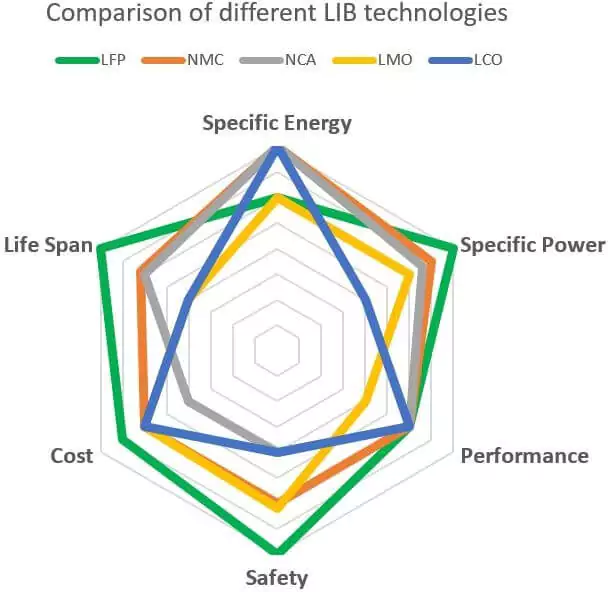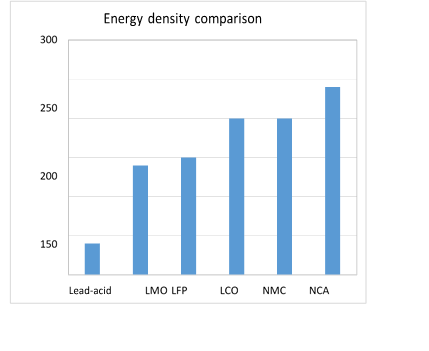Author: MUHAMMAD IBRAR YOUNAS / SUNWODA TEAM
Lithium iron phosphate (LFP) batteries have emerged as a leading battery chemistry for residential energy storage applications. LFP offers distinct advantages over other lithium-ion chemistries, including high safety, long cycle life, and high power performance. This makes LFP an excellent choice for solar energy storage and backup power needs in homes. Features of different Li-ion batteries are compared below.


Some of the characteristics of LFP batteries are summarized in the following table.
|
Specifications |
Lead-acid |
LFP |
NMC |
NCA |
|
Nominal voltage (V) |
2 |
3.2 |
3.6 – 3.7 |
3.6 – 3.7 |
|
Typical operating range (V/cell) |
1.6 – 2.4 |
2.5 – 3.6 |
2.5 – 4.2 |
2.5 – 4.2 |
|
Specific energy (Wh/kg) |
30 – 50 |
90 – 200 |
150 – 220 |
200 – 260 |
|
Typical charge rate |
0.2C |
0.5C |
0.5C |
0.5C |
|
Typical discharge rate |
0.1-0.5C |
1-2C |
1-2C |
1C |
|
Charge temperature (C) |
-20 – 50 |
0 – 55 |
0 – 50 |
0 – 50 |
|
Discharge temperature (C) |
-20 – 50 |
-20 – 55 |
-20 – 50 |
-20 – 50 |
|
Cycle life (100%DOD) |
200 – 300 |
1000 – 5000 |
500 – 2000 |
500 – 2000 |
|
Thermal runaway temperature (C) and comment |
100 – 150 |
270 |
210 |
150 |
|
Plastic container gets soften and melt |
Safe even if fully charged |
High charge promotes thermal runaway |
High charge promotes thermal runaway |
LFP batteries, or Lithium Iron Phosphate batteries, are renowned for their outstanding safety profile compared to other Li-Ion chemistries and traditional lead-acid batteries. Due to their stable chemical composition, LFP batteries exhibit reduced risks of thermal runaway and overheating, minimizing the likelihood of fire or explosion. In contrast, chemistries like NCM (Nickel Cobalt Manganese), NCA (Nickel Cobalt Aluminum), LCO (Lithium Cobalt Oxide), and LMO (Lithium Manganese Oxide) may have higher safety risks and are more prone to thermal instability. Additionally, LFP batteries boast a longer cycle life and can endure a higher number of charge-discharge cycles. Below is a table for further comparison:
|
Battery Chemistry |
Safety Profile |
Thermal Stability |
Chemical Stability |
Cycle Life |
Energy Density |
|
LFP |
Excellent |
High |
High |
Long |
Moderate |
|
NCM |
Good |
Moderate |
Moderate |
Moderate |
High |
|
NCA |
Good |
Moderate |
Low |
Moderate |
High |
|
Lead Acid |
Fair |
Moderate |
Moderate |
Short |
Low |
|
LCO |
Fair |
Low |
Low |
Short |
High |
|
LMO |
Fair |
Moderate |
Moderate |
Moderate |
High |
Certification Standards for Residential LFP Batteries
Installing lithium-ion batteries in a home comes with risks if improperly designed, manufactured, or certified. Various standards exist to ensure residential batteries meet minimum safety, durability, and performance criteria. Certification by respected third-party organizations indicates a battery system has passed rigorous testing and evaluation. Here are key standards and certifications for LFP batteries intended for residential deployment.
• UN 38.3: UN recommendations on safety testing of lithium batteries under conditions like thermal, shock, and external short circuit. Applicable for battery transport.
• CE (Conformité Européene): CE certification indicates that the product meets the health, safety, and environmental protection standards required in the European Economic Area (EEA). LFP batteries must comply with CE standards to be sold in European countries.
• IEC 62619 (International Electrotechnical Commission): Handles safety requirements specific to lithium-ion batteries across small and large-formats. Tests include overcharge, short circuit, crush, flame exposure. The IEC standards are widely accepted and used internationally.
• UL9540 and UL9540A: These UL (Underwriters Laboratories) standards cover the safety of grid connected energy storage systems, including batteries. UL9540 focuses on the overall system safety, while UL9540A specifically addresses the fire performance requirements. These certifications are typically required in North America, particularly the United States.
• UL 1973 (Underwriters Laboratories): North American safety standard for batteries used in stationary storage. Specifies tests including temperature cycling, humidity, vibration, and crush.
• FCC (Federal Communications Commission): FCC certification is specific to electromagnetic interference (EMI) compliance for electronic devices, including LFP battery systems with wireless communication capabilities. This certification ensures that the product does not interfere with other electronic devices and operates within permissible limits. It is necessary for products intended for sale in the United States.
Sunwoda Group is a leading manufacturer of high-quality LFP batteries with an extensive global presence, encompassing more than 10 production bases in China and various locations worldwide. Specializing in energy storage systems, our diverse product portfolio includes portable power supply solutions ranging from 1 kWh to 3 kWh, residential energy storage solutions spanning from 3 kWh to 60 kWh, and Commercial & Industrial (C&I) systems ranging from 60 kWh to 1 MWh. Furthermore, we offer utility-scale energy storage systems, catering to requirements from 1 MWh to an impressive 40+ MWh.
Committed to delivering safe and reliable products, Sunwoda Group has obtained all necessary certifications, ensuring compliance with stringent industry standards. With a steadfast dedication to quality, innovation, and sustainability, we continue to solidify our position as a prominent player in the energy storage sector. Our unwavering commitment to excellence enables us to provide cutting-edge solutions that meet the evolving demands of the market and foster lasting partnerships with our esteemed customers worldwide.